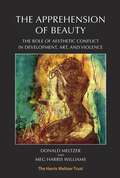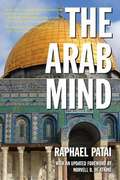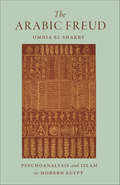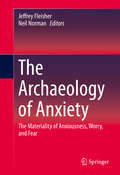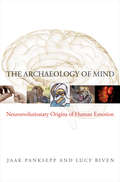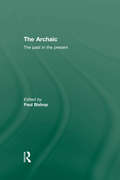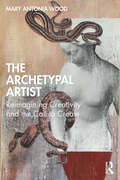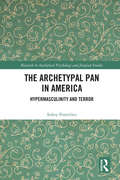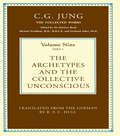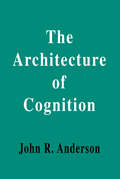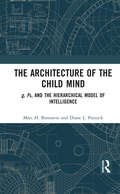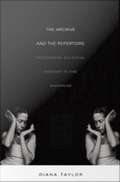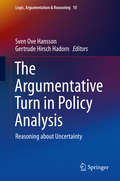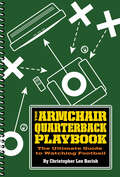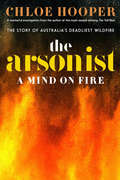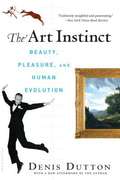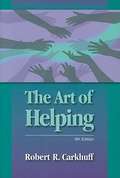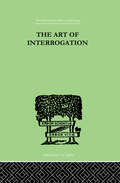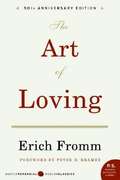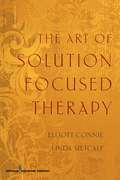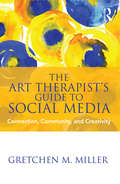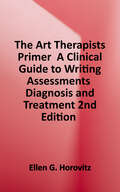- Table View
- List View
The Apprehension of Beauty: The Role of Aesthetic Conflict in Development, Art and Violence
by Meg Harris Williams Donald MeltzerThis volume has grown over the years as a family project of Martha Harris, her two daughters Meg and Morag and her husband, Donald Meltzer. It therefore has its roots in English literature and its branches waving wildly about in psychoanalysis. It is earnestly hoped that it will reveal more problems than it will solve.
The Aquarian Conspiracy
by Marilyn FergusonThe Aquarian Conspiracy is a breathtaking, compelling study of the changes in work, relationships, medicine, religion, and education during the 1980s.
The Arab Mind (Revised Edition )
by Raphael PataiThe classic study of Arab culture and society that help us better understand a complex, proud and ancient culture. This book discusses the upbringing of a typical Arab boy or girl, the intense concern with honor and courage, the Arabs' tendency toward extremes of behavior, and their ambivalent attitudes toward the West. Chapters are devoted to the influence of Islam, sexual mores, Arab language and Arab art, Bedouin values, Arab nationalism, and the pervasive influence of Westernization. With a new foreword by Norvell B. DeAtkine, Director of Middle East Studies at the JFK Special Warfare Center and School, Fort Bragg, N.C., this book unravels the complexities of Arab traditions and provides authentic revelations of Arab mind and character.
The Arabic Freud: Psychoanalysis and Islam in Modern Egypt
by Omnia El ShakryThe first in-depth look at how postwar thinkers in Egypt mapped the intersections between Islamic discourses and psychoanalytic thoughtIn 1945, psychologist Yusuf Murad introduced an Arabic term borrowed from the medieval Sufi philosopher and mystic Ibn ‘Arabi—al-la-shu‘ur—as a translation for Sigmund Freud’s concept of the unconscious. By the late 1950s, Freud’s Interpretation of Dreams had been translated into Arabic for an eager Egyptian public. In The Arabic Freud, Omnia El Shakry challenges the notion of a strict divide between psychoanalysis and Islam by tracing how postwar thinkers in Egypt blended psychoanalytic theories with concepts from classical Islamic thought in a creative encounter of ethical engagement.Drawing on scholarly writings as well as popular literature on self-healing, El Shakry provides the first in-depth examination of psychoanalysis in Egypt and reveals how a new science of psychology—or “science of the soul,” as it came to be called—was inextricably linked to Islam and mysticism. She explores how Freudian ideas of the unconscious were crucial to the formation of modern discourses of subjectivity in areas as diverse as psychology, Islamic philosophy, and the law. Founding figures of Egyptian psychoanalysis, she shows, debated the temporality of the psyche, mystical states, the sexual drive, and the Oedipus complex, while offering startling insights into the nature of psychic life, ethics, and eros.This provocative and insightful book invites us to rethink the relationship between psychoanalysis and religion in the modern era. Mapping the points of intersection between Islamic discourses and psychoanalytic thought, it illustrates how the Arabic Freud, like psychoanalysis itself, was elaborated across the space of human difference.
The Archaeology of Anxiety
by Jeffrey Fleisher Neil NormanRecent efforts to engage more explicitly with the interpretation of emotions in archaeology have sought new approaches and terminology to encourage archaeologists to take emotions seriously. This is part of a growing awareness of the importance of senses--what we see, smell, hear, and feel--in the constitution and reconstitution of past social and cultural lives. Yet research on emotion in archaeology remains limited, despite the fact that such states underpin many studies of socio-cultural transformation. The Archaeology of Anxiety draws together papers that examine the local complexities of anxiety as well as the variable stimuli--class or factional struggle, warfare, community construction and maintenance, personal turmoil, and responsibilities to (and relationships with) the dead--that may generate emotional responses of fear, anxiousness, worry, and concern. The goal of this timely volume is to present fresh research that addresses the material dimension of rites and performances related to the mitigation and negotiation of anxiety as well as the role of material culture and landscapes in constituting and even creating periods or episodes of anxiety.
The Archaeology of Mind: Neuroevolutionary Origins of Human Emotions (Norton Series on Interpersonal Neurobiology)
by Jaak Panksepp Lucy BivenA look at the seven emotional systems of the brain by the researcher who discovered them. What makes us happy? What makes us sad? How do we come to feel a sense of enthusiasm? What fills us with lust, anger, fear, or tenderness? Traditional behavioral and cognitive neuroscience have yet to provide satisfactory answers. The Archaeology of Mind presents an affective neuroscience approach--which takes into consideration basic mental processes, brain functions, and emotional behaviors that all mammals share--to locate the neural mechanisms of emotional expression. It reveals--for the first time--the deep neural sources of our values and basic emotional feelings. This book elaborates on the seven emotional systems that explain how we live and behave. These systems originate in deep areas of the brain that are remarkably similar across all mammalian species. When they are disrupted, we find the origins of emotional disorders: - SEEKING: how the brain generates a euphoric and expectant response - FEAR: how the brain responds to the threat of physical danger and death - RAGE: sources of irritation and fury in the brain - LUST: how sexual desire and attachments are elaborated in the brain - CARE: sources of maternal nurturance - GRIEF: sources of non-sexual attachments - PLAY: how the brain generates joyous, rough-and-tumble interactions - SELF: a hypothesis explaining how affects might be elaborated in the brain The book offers an evidence-based evolutionary taxonomy of emotions and affects and, as such, a brand-new clinical paradigm for treating psychiatric disorders in clinical practice.
The Archaic: The Past in the Present
by Paul BishopThe Archaic takes as its major reference points C.G. Jung's classic essay, 'Archaic Man' (1930), and Ernesto Grassi's paper on 'Archaic Theories of History' (1990). Moving beyond the confines of a Jungian framework to include other methodological approaches, this book explores the concept of the archaic. Defined as meaning 'old-fashioned', 'primitive', 'antiquated', the archaic is, in fact, much more than something very, very old: it is timeless, inasmuch as it is before time itself. Archē, Urgrund, Ungrund, 'primordial darkness', 'eternal nothing' are names for something essentially nameless, yet whose presence we nevertheless intuit. This book focuses on the reception of myth in the tradition of German Idealism or Romanticism (Creuzer, Schelling, Nietzsche), which not only looked back to earlier thinkers (such as Jacob Boehme) but also laid down roots for developments in twentieth-century thought (Ludwig Klages, Martin Heidegger). The Archaic also includes: studies of the Germanic dimension of the archaic (Charles Bambach, Alan Cardew) a discussion of the mytho-phenomenological approach to the archaic (Robert Josef Kozljanič) a series of articles on Jung's understanding of the archaic (Paul Bishop, Susan Rowland, Robert Segal). This book will be of interest to psychoanalysts, anthropologists and phenomenologists, as well as students of psychology, cultural studies, religious studies, and philosophy, as it seeks to rehabilitate a concept of demonstrable and urgent relevance for our time.
The Archetypal Artist: Reimagining Creativity and the Call to Create
by Mary Antonia WoodIn this thoughtful and revelatory book, Wood explores enduring and powerful theories on art, creativity, and what Jung called the "creative spirit" in order to illuminate how artists can truly understand what it means to be a creator. By bringing together insights on creativity from some of depth psychology’s most iconic thinkers, such as C.G. Jung, James Hillman, and Joseph Campbell, as well as featuring a selection of creators who have been influenced by these ideas, such as Martha Graham, Mary Oliver, Stanley Kunitz, and Ursula K. Le Guin, this book explores archetypal thought and the role of the artist in society. This unique approach emphasizes the foundational need to understand and work with the unconscious forces that underpin a creative calling, deepening our understanding of the transformational power of creativity, and the vital role of the artist in the modern world. Acting as a touchstone for inquiries into the nature of creativity, and of the soul, this enlightening book is perfect for artists and creators of all types, as well as Jungian analysts and therapists, and academics interested in the arts, humanities, and depth psychology.
The Archetypal Pan in America: Hypermasculinity and Terror (Research in Analytical Psychology and Jungian Studies)
by Sukey FontelieuThe Archetypal Pan in America examines the complex moral and ethical dilemmas that Americans have had to face over the last few decades, including the motivations for the Vietnam War; who was in control of women’s productive rights; how to extend civil rights to all; protests for the historically unapologetic narrative of the genocide of Native Americans; and the growing number of school shootings since the Columbine massacre. Fontelieu suggests that the emotional pain these issues created has not resolved and that it continues to surface, in the guise of new issues, but with a similar dysfunctional pattern. The book argues that this pattern acts in the culture in the same manner as a psychological defense system: stimulating fight, flight, or freeze reactions; requiring great stores of energy when activated; and deflecting attention from other areas. Relying on Jung’s theory of the applicability of myth to psychological problems and the post-Jungian theory of cultural complexes, the myths of the Greek god Pan are used to scaffold a metaphor that informs this pattern. Fontelieu proposes that, rather than looking inward as a culture for how to accept its changing role in a global world, this pattern reinforces dysfunctional emotional responses to the reoccurring traumas of modernity, responses such as an increase in the magnetic appeal of hypermasculinity, or choosing to remain naively self-absorbed. The Archetypal Pan in America will be of great interest to Jungian analysts and scholars of depth psychology, as well as academics and postgraduate students studying psychology, foreign studies, literary criticism, politics and cultural studies.
The Archetypes and the Collective Unconscious: Archetypes And The Collective Unconscious (Collected Works of C. G. Jung #10)
by C.G. JungThe concept of 'Archteypes' and the hypothesis of 'A Collective Unconscious' are two of Jung's better known and most exciting ideas. In this volume - taken from the Collected Works and appearing in paperback for the first time - Jung describes and elaborates the two concepts. Three essays establish the theoretical basis which are then followed by essays on specific archetypes. The relation of these to the process of individuation is examined in the last section. The Archetypes and the Collective Unconscious is one of Jung's central works. There are many illustrations in full colour.
The Architecture of Cognition (Cognitive Science Ser. #No. 5)
by John R. AndersonNow available in paper, The Architecture of Cognition is a classic work that remains relevant to theory and research in cognitive science. The new version of Anderson's theory of cognitive architecture -- Adaptive Control of Thought (ACT*) -- is a theory of the basic principles of operation built into the cognitive system and is the main focus of the book.
The Architecture of Madness: Insane Asylums in the United States (Architecture, Landscape and Amer Culture)
by Carla YanniElaborately conceived, grandly constructed insane asylums—ranging in appearance from classical temples to Gothic castles—were once a common sight looming on the outskirts of American towns and cities. Many of these buildings were razed long ago, and those that remain stand as grim reminders of an often cruel system. For much of the nineteenth century, however, these asylums epitomized the widely held belief among doctors and social reformers that insanity was a curable disease and that environment—architecture in particular—was the most effective means of treatment. In The Architecture of Madness, Carla Yanni tells a compelling story of therapeutic design, from America&’s earliest purpose—built institutions for the insane to the asylum construction frenzy in the second half of the century. At the center of Yanni&’s inquiry is Dr. Thomas Kirkbride, a Pennsylvania-born Quaker, who in the 1840s devised a novel way to house the mentally diseased that emphasized segregation by severity of illness, ease of treatment and surveillance, and ventilation. After the Civil War, American architects designed Kirkbride-plan hospitals across the country. Before the end of the century, interest in the Kirkbride plan had begun to decline. Many of the asylums had deteriorated into human warehouses, strengthening arguments against the monolithic structures advocated by Kirkbride. At the same time, the medical profession began embracing a more neurological approach to mental disease that considered architecture as largely irrelevant to its treatment. Generously illustrated, The Architecture of Madness is a fresh and original look at the American medical establishment&’s century-long preoccupation with therapeutic architecture as a way to cure social ills. Carla Yanni is associate professor of art history at Rutgers University and the author of Nature&’s Museums: Victorian Science and the Architecture of Display.
The Architecture of the Child Mind: g, Fs, and the Hierarchical Model of Intelligence
by Marc H. Bornstein Diane L. PutnickWhat exactly does it mean to be intelligent? Does intelligence manifest itself in one way or in different ways in children? Do children fit any preconceived notions of intelligence? Some theories assert a general (g) factor for intelligence that is universal and enters all mental abilities; other theories state that there are many separate domains or faculties (Fs) of intelligence; and still others argue that the g and Fs of intelligence coexist in a hierarchical relation. The Architecture of the Child Mind: g, Fs, and the Hierarchical Model of Intelligence argues for the third option in young children. Through state-of-the-art methodologies in an intensive research program conducted with 4-year-old children, Bornstein and Putnick show that the structure of intelligence in the preschool child is best construed as a hierarchically organized combination of a General Intelligence factor (g) and multiple domain-specific faculties (Fs). The Architecture of the Child Mind offers a review of the history of intelligence theories and testing, and a comprehensive and original research effort on the nature and structure of intelligence in young children before they enter school. Its focus on intelligence will appeal to cognitive, developmental, and social psychologists as well as researchers and scholars in education, particularly those specializing in early childhood education.
The Architecture of the Roman Triumph
by Maggie L. PopkinThis book offers the first critical study of the architecture of the Roman triumph, ancient Rome's most important victory ritual. Through case studies ranging from the republican to imperial periods, it demonstrates how powerfully monuments shaped how Romans performed, experienced, and remembered triumphs and, consequently, how Romans conceived of an urban identity for their city. Monuments highlighted Roman conquests of foreign peoples, enabled Romans to envision future triumphs, made triumphs more memorable through emotional arousal of spectators, and even generated distorted memories of triumphs that might never have occurred. This book illustrates the far-reaching impact of the architecture of the triumph on how Romans thought about this ritual and, ultimately, their own place within the Mediterranean world. In doing so, it offers a new model for historicizing the interrelations between monuments, individual and shared memory, and collective identities.
The Archive and the Repertoire: Performing Cultural Memory in the Americas
by Diana TaylorIn The Archive and the Repertoire preeminent performance studies scholar Diana Taylor provides a new understanding of the vital role of performance in the Americas. From plays to official events to grassroots protests, performance, she argues, must be taken seriously as a means of storing and transmitting knowledge. Taylor reveals how the repertoire of embodied memory--conveyed in gestures, the spoken word, movement, dance, song, and other performances--offers alternative perspectives to those derived from the written archive and is particularly useful to a reconsideration of historical processes of transnational contact. The Archive and the Repertoire invites a remapping of the Americas based on traditions of embodied practice. Examining various genres of performance including demonstrations by the children of the disappeared in Argentina, the Peruvian theatre group Yuyachkani, and televised astrological readings by Univision personality Walter Mercado, Taylor explores how the archive and the repertoire work together to make political claims, transmit traumatic memory, and forge a new sense of cultural identity. Through her consideration of performances such as Coco Fusco and Guillermo Gmez-Pea's show Two Undiscovered Amerindians Visit . . . , Taylor illuminates how scenarios of discovery and conquest haunt the Americas, trapping even those who attempt to dismantle them. Meditating on events like those of September 11, 2001 and media representations of them, she examines both the crucial role of performance in contemporary culture and her own role as witness to and participant in hemispheric dramas. The Archive and the Repertoire is a compelling demonstration of the many ways that the study of performance enables a deeper understanding of the past and present, of ourselves and others.
The Argumentative Turn in Policy Analysis
by Sven Ove Hansson Gertrude Hirsch HadornThisbook describes argumentative tools and strategies that can be used to guidepolicy decisions under conditions of great uncertainty. Contributing authorsexplore methods from philosophical analysis and in particular argumentationanalysis, showing how it can be used to systematize discussions about policyissues involving great uncertainty. The first part of the work exploreshow to deal in a systematic way with decision-making when there may be pluralperspectives on the decision problem, along with unknown consequences of whatwe do. Readers will see how argumentation tools can be used for prioritizingamong uncertain dangers, for determining how decisions should be framed, forchoosing a suitable time frame for a decision, and for systematically choosingamong different decision options. Case studies are presented in thesecond part of the book, showing argumentation in practice in the areas ofclimate geoengineering, water governance, synthetic biology, nuclear waste, andfinancial markets. In one example, argumentation analysis is applied toproposals to solve the climate problem with various technological manipulationsof the natural climate system, such as massive dispersion of reflectiveaerosols into the stratosphere. Even after a thorough investigation of such aproposal, doubt remains as to whether all the potential risks have beenidentified. In such discussions, conventional risk analysis does not have muchto contribute since it presupposes that the risks have been identified, whereasthe argumentative approach to uncertainty management can be used to systematizediscussions.
The Armchair Quarterback Playbook: The Ultimate Guide to Watching Football
by Christopher Lee BarishEvery weekend from August through January, 25 million Americans plop into their Lay-Z-Boys, crack open a beer, and watch football on television. At last, here is an illustrated book that celebrates their pastime and codifies their culture of extreme devotion like no other. The Armchair Quarterback Playbook is both hilarious and authentic, and is designed like a real football playbookcomplete with modified X and O diagrams. Everything a stay-at-home fan needs to know is here: how to redirect an interfering spouse ("The Listen and Respond Fake"), methods for keeping children at bay ("Intentional Grounding), equipment and etiquette tips, game food recipes, armchair quarterback vernacular, and more. Written by a certified "AQ," this is the perfect book for the football fanatic.
The Arsonist: A Mind on Fire
by Chloe HooperThe true story of the most devastating wildfire in Australian history and the search for the man who started it.What kind of person would deliberately start a firestorm? What kind of mind? On the scorching February day in 2009 that became known as Black Saturday, a man lit two fires in Victoria's Latrobe Valley, then sat on the roof of his house to watch the inferno. In the Valley, where the rates of crime were the highest in the state, more than thirty people were known to the police as firebugs. But the detectives soon found themselves on the trail of a man they didn't know. The Arsonist takes readers on the hunt for this man, and inside the strange puzzle of his mind. This book is also the story of fire in Australia, and of a community that owed its existence to that very element. The command of fire has defined and sustained us as a species--understanding its abuse will shape our future. A powerful true-crime thriller written with Hooper's trademark lyric detail and nuance, The Arsonist is a reminder that in an age of fire, all of us are gatekeepers.
The Art Instinct: Beauty, Pleasure, & Human Evolution
by Denis DuttonThe Art Instinct combines two of the most fascinating and contentious disciplines, art and evolutionary science, in a provocative new work that will revolutionize the way art itself is perceived. Aesthetic taste, argues Denis Dutton, is an evolutionary trait, and is shaped by natural selection. It's not, as almost all contemporary art criticism and academic theory would have it, "socially constructed.
The Art Of Helping
by Robert CarkhuffThis is the ninth edition of The Art of Helping. More than 500,000 copies have been sold over three decades. Literally, millions of people have been trained in helping skills. Many more have been recipients of these skills. The effects upon hundreds of thousand of these recipients have been researched. The results are in: skills acquisition and use are spectacularly powerful. This book explains the essential interpersonal skills needed by professional and lay counselors, teachers, business managers, parents, everyone. All in an easy to understand manner.
The Art Of Interrogation: Studies in the Principles of Mental Tests and Examinations (International Library Of Psychology Ser.)
by Hamilton, E RFirst published in 1999. Routledge is an imprint of Taylor & Francis, an informa company.
The Art Of Loving
by Peter D. Kramer Erich Fromm Rainer Funk Marion PauckThe fiftieth Anniversary Edition of the groundbreaking international bestseller that has shown millions of readers how to achieve rich, productive lives by developing their hidden capacities for love Most people are unable to love on the only level that truly matters: love that is compounded of maturity, self-knowledge, and courage. As with every art, love demands practice and concentration, as well as genuine insight and understanding. In his classic work, The Art of Loving, renowned psychoanalyst and social philosopher Erich Fromm explores love in all its aspects--not only romantic love, steeped in false conceptions and lofty expectations, but also brotherly love, erotic love, self-love, the love of God, and the love of parents for their children.
The Art Of Solution Focused Therapy
by Linda Metcalf Elliott ConnieWhat is Solution-Focused Therapy? Solution Focused Therapy (SFT) is a unique, goal-directed therapy aimed at helping clients regain autonomy by determining and achieving their own goals. Solution focused therapists encourage clients to focus on solutions, not problems, and help clients effectively plan how to reach their goals. Unlike other therapies, SFT holds an abiding belief in clients' abilities to know what is best for them, rather than have a therapist tell them. Why this book? This book not only provides an overview of the Solution Focused therapy model, its basic tenets, and theories; it also presents intimate interviews with expert practitioners-all of whom use SFT in their own practice. To this end, the book offers a wealth of insight into the theory and practice of SFT, to help practitioners decide whether SFT is right for them and their clients. These experts offer details of their apprehensions, goals, breakthroughs, and overall experiences with the therapy. The team of expert contributors includes Eve Lipchik, Yvonne Dolan, Alasdair Macdonald, Thorana Nelson, and many more. Questions the experts address include: How did you discover that SFT was the model that fit your clients' needs? What characteristics of this model drew you towards it? How has SFT impacted your personal life? What is it about SFT that makes it so effective? What are your favorite cases and how did they affect your work as a therapist?
The Art Therapist's Guide to Social Media: Connection, Community, and Creativity
by Gretchen M. MillerThe Art Therapist’s Guide to Social Media offers the art therapy community a guide that addresses content related to social media use, its growing influence, and the impact social networking has on the profession and work of art therapists. This book presents a framework of relevant theories, best practices, and examples to explore existing and emerging areas of social networking's power for art therapists as practitioners and artists. Divided into three sections that highlight the themes of connection, community, and creativity, chapters explore timely topics such as the professional use of social media, ethical considerations, potential benefits and challenges, and strategies to embrace the possibilities that social media can create for the field worldwide. Art therapists in training, art therapy educators and supervisors, and practicing art therapists will find content in this text helpful for their learning and professional practice.
The Art Therapists' Primer: A Clinical Guide to Writing Assessments, Diagnosis, and Treatment
by Ellen G. HorovitzThis landmark publication has been thoroughly revised and brought up to date in the Second Edition. Doctor Ellen G. Horovitz shares over thirty-five years of experience as she transliterates evidence-based art therapy into medical terminology. <p><p>This treatise spells out the how-to's behind producing art therapy assessments, process notes, significant sessions, objectives and modalities, termination summaries and internet-based assessments into translatable documentation, designed to dovetail within an interdisciplinary medical model. This step-by-step methodology fashions these reports, places art therapy on equal footing with all mental health workers and generates records, which serves as points of departure for future practitioners. <p><p>The experienced clinician will gather pertinent skills to enhance his or her practice. The student or seasoned graduate will harness the necessary armament to write clinically-based reports that serve as a model for the field, and educators can use this manual as a teaching tool. The Appendices (A-L) provide a wealth of information and forms to use in a clinically-based art therapy practice. Recording and communicating clinical findings in a cogent manner to a clinical medical and/or educational team is the trademark of this opus. In addition, there is a DVD located in the back of this book where the reader will find all the Appendix Forms, all images in color (by chapter) and three movies on conducting the CATA, ATDA and BATA. <p><p>This must-have reference manual amasses information that will serve as a companion guide for every art therapist (neophyte or seasoned) to formulate clinical reports, and it will aid clients towards a trajectory of wellness, recovery and, above all, health. Through the guidance of Horovitz's milestone text, art therapists will not only walk the walk, but more significantly, learn how to talk the talk.
